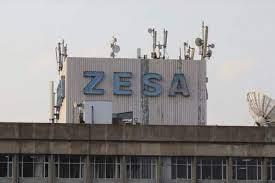News / National
Cabinet speaks on power supply shortages amid prolonged blackouts
16 Oct 2024 at 11:11hrs |
0 Views

The Zimbabwean government has announced a series of measures to address the country's ongoing power supply shortages as extended daily blackouts continue to disrupt homes and businesses nationwide.
Speaking at a Cabinet briefing on Tuesday, Information Minister Jenfan Muswere outlined a strategy aimed at boosting local electricity generation and stabilizing the national grid. Zimbabwe currently faces a power generation deficit of up to 400 megawatts (MW), relying on imports of between 200 and 500 MW from neighboring countries to bridge the gap.
The power outages, which start at 6 AM and can last until 10 PM, leave residents and businesses without electricity for up to 16 hours each day, severely affecting daily life and economic activities.
"Cabinet approved a raft of measures to enhance the country's power security," Muswere said, outlining a plan that includes the rehabilitation of Hwange Units 1 to 6 under a Build, Operate, and Transfer (BOT) arrangement starting this year. The initiative also involves the Mutapa Investment Fund, which will provide foreign currency to support Independent Power Producers (IPPs), seen as crucial to meeting Zimbabwe's electricity needs.
The government also plans to streamline the management and governance structure of ZESA Holdings, the state-owned power utility, to improve efficiency. ZESA, which has struggled with operational challenges despite recent tariff increases, is expected to benefit from the restructuring.
To reduce the growing dependence on solar energy, ZESA has been tasked with promoting and simplifying the net-metering process, which would allow solar users to sell excess energy back to the national grid. Muswere noted that expanding the use of solar power could ease pressure on the grid and contribute to a more sustainable energy future for Zimbabwe.
Additionally, the government aims to curb power losses during transmission by forming a joint venture between ZESA's transmission subsidiary, ZENT, and local firm QLV. This partnership will focus on manufacturing cables locally to reduce losses and combat theft and corruption in the power sector.
The prolonged blackouts have forced many Zimbabweans to seek alternative energy sources, particularly solar power, as the outages have had a severe impact on the economy.
The government's latest efforts to resolve the energy crisis are seen as vital to achieving its Vision 2030 goal of reaching upper-middle-income status. However, public frustration is mounting as the energy shortages threaten to derail the country's economic recovery.
Speaking at a Cabinet briefing on Tuesday, Information Minister Jenfan Muswere outlined a strategy aimed at boosting local electricity generation and stabilizing the national grid. Zimbabwe currently faces a power generation deficit of up to 400 megawatts (MW), relying on imports of between 200 and 500 MW from neighboring countries to bridge the gap.
The power outages, which start at 6 AM and can last until 10 PM, leave residents and businesses without electricity for up to 16 hours each day, severely affecting daily life and economic activities.
"Cabinet approved a raft of measures to enhance the country's power security," Muswere said, outlining a plan that includes the rehabilitation of Hwange Units 1 to 6 under a Build, Operate, and Transfer (BOT) arrangement starting this year. The initiative also involves the Mutapa Investment Fund, which will provide foreign currency to support Independent Power Producers (IPPs), seen as crucial to meeting Zimbabwe's electricity needs.
The government also plans to streamline the management and governance structure of ZESA Holdings, the state-owned power utility, to improve efficiency. ZESA, which has struggled with operational challenges despite recent tariff increases, is expected to benefit from the restructuring.
To reduce the growing dependence on solar energy, ZESA has been tasked with promoting and simplifying the net-metering process, which would allow solar users to sell excess energy back to the national grid. Muswere noted that expanding the use of solar power could ease pressure on the grid and contribute to a more sustainable energy future for Zimbabwe.
Additionally, the government aims to curb power losses during transmission by forming a joint venture between ZESA's transmission subsidiary, ZENT, and local firm QLV. This partnership will focus on manufacturing cables locally to reduce losses and combat theft and corruption in the power sector.
The prolonged blackouts have forced many Zimbabweans to seek alternative energy sources, particularly solar power, as the outages have had a severe impact on the economy.
The government's latest efforts to resolve the energy crisis are seen as vital to achieving its Vision 2030 goal of reaching upper-middle-income status. However, public frustration is mounting as the energy shortages threaten to derail the country's economic recovery.
Source - Kukurigo Updates
Join the discussion
Loading comments…



























